Once it became clear that Georges Brassens was a major recording artist in their catalog, PHILIPS reissued all his albums, EPs and LPs as a collection (dubbed Fake Wood for their design) that spans 12 albums which cover chronologically everything Brassens released until his death. Nowadays there are many more options of course for those who want to add Brassens to their music collection, but these are the albums that I grew up with and they are my personal reference. In addition to the no non-sense presentation on the front, each album featured on the back descriptive blurbs about each song, penned by Brassens’ old friend and writer René Fallet. Rather than translating those, I offer to the English listener my own notes as a guide.
Français
L’œuvre principale de Georges Brassens se répartit sur ce qui est devenu au fil du repackaging et du marketing une douzaine d’albums judicieusement intitulés de I à XII. Cette appellation reflète à la fois la constante de l’approche musicale de Brassens, qui n’a jamais dévié dans la simplicité de sa présentation, et aussi le fait que chaque album est tout bêtement une collection de chansons sans lien apparent autre que d’avoir été créées plus au moins à la même époque. Il est donc difficile de séparer les albums sinon en les associant à une tranche de temps spécifique, raisonnement plus valable pour les derniers albums que pour les premiers. Ceux-ci étaient ‘mes’ albums et l’œuvre à laquelle je me consacre. Nombre autres pochettes et séries existent et bien d’autres chansons ont fait surface à titre posthume.
Les liens mènent vers mes versions anglaises ainsi que quelques interprétations en français.

I (1952)
La mauvaise réputation Bad Rep
Le fossoyeur Gravedigger
Le gorille The Gorilla
Ballade des dames du temps jadis
Le parapluie The Umbrella
La marine L’amour marin
Corne d’Aurochs Beefalo Bill
Il suffit de passer le pont
Highlights
The obvious starting point to discover Brassens. La mauvaise réputation indeed sealed his rep and Le gorille branded him forever. A fervent poetry lover, he also set selected poems to music: of special note, his homage to François Villon (Ballade des dames…) is masterful, while Le Petit Cheval is now sung by French children and, along with other adaptations, brought Paul Fort to everyone’s attention.
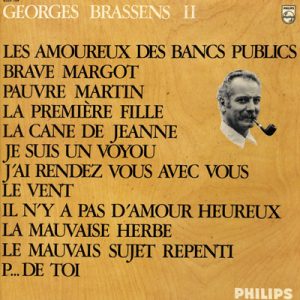
II (1953)
Les amoureux des bancs publics Park Bench Lovers
Brave Margot Margot The Milkmaid
Pauvre Martin Poor Ole Martin
La première fille The First Girl
Je suis un voyou A Rogue I Am
J’ai rendez-vous avec vous
Le vent
Il n’y a pas d’amour heureux There Is No Happy Love
La mauvaise herbe Tumbleweed
Le mauvais sujet repenti The Bottom Line
Putain de toi Ho Be Thee
Highlights
An essential collection of songs that Brassens wrote in his lean years, as if his life depended on it. Well, it turned out it did. They’re gems. He unabashedly continues to raise eyebrows with Brave Margot and Putain de Toi. In turns funny, irreverent, rebellious and tender, these are songs for the ages, and they’re damn hummable.
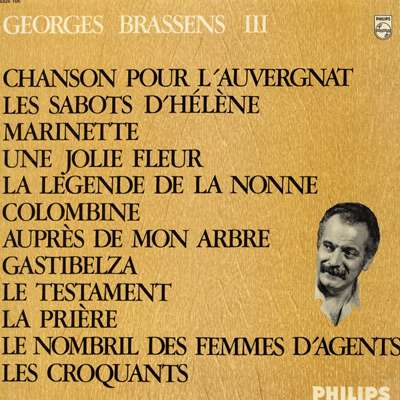
III (1954)
Chanson pour l’Auvergnat Song For An Earth Angel
Les sabots d’Hélène Marcy’s Wooden Clogs
Marinette Brigit
Auprès de mon arbre
Gastibelza
Le testament Last Will
Le nombril des femmes d’agents Ladycop’s Bellybutton
Les croquants Plutocrats
Highlights
While still dipping into his backlog of songs, Brassens creates new ones as a now recognized recording artist. He pays loving tribute to his humble writing roots with Auprès de mon arbre, and Chanson pour l’Auvergnat – a beautiful ode that became a universal tribute to kind-heartedness. It remains to this day the Brassens song that surely everyone knows. Of poetic note is his reverend nod to Victor Hugo with two wonderful adaptations (La légende de la nonne & Gastibelza).
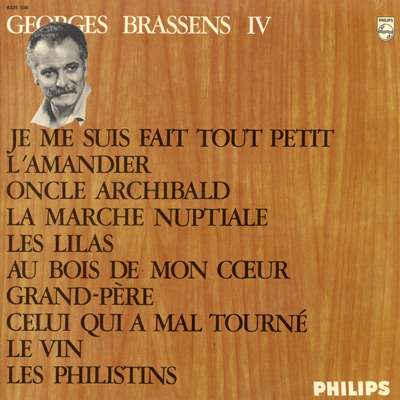
IV (1955-1957)
Je m’suis fait tout p’tit For A Little Doll
L’amandier The Cherry Tree
Oncle Archibald Uncle Archie
Les lilas
Au bois de mon cœur In My Heart’s Backyard
Celui qui a mal tourné One Bad Egg
Les Philistins
Highlights
Brassens confirms his mastery of songwriting by perfecting the fine balance between texts and melodies that stand the test of time. Fifty years later, when I played Je m’suis fait tout petit (another song that most French speakers know) to unknowing English speaking audiences, their ears pricked up instantly at the music. There is a lovely flow to this album, which ends on a fitting note penned by little-known poet Jean Richepin.
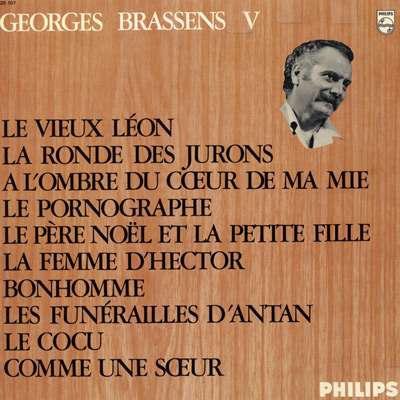
V (1958-1960)
Le vieux Léon Ol’ Leon
À l’ombre du cœur de ma mie In The Shade Of A Maiden’s Love
Le pornographe The Pornophone
Le Père Noël et la petite fille Santa’s Girl
La femme d’Hector Victor’s Wife
Bonhomme Natural Mate
Les funérailles d’antan Funerals Of Yore
Comme une sœur Lotus Flower
Highlights
The now well-established French star responds to prudish critics with the hilarious Le Pornographe. No less hilarious is his irreverent poke at death with Les funérailles d’antan. On a more serious note, he masters the short verse form with Le vieux Léon, while Bonhomme is what then equally famous Claude Nougaro will sing in homage at his funeral, many years later.
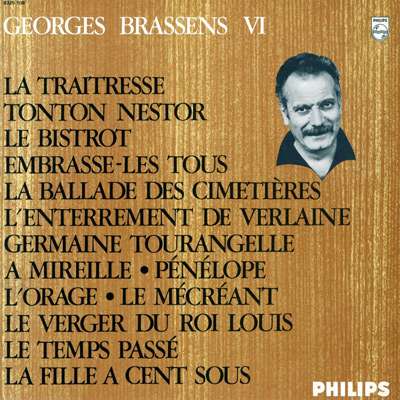
VI (1961)
La traîtresse Traitress
Pénélope
L’orage Thunderstorm
Le mécréant
Le verger du roi Louis
Le temps passé Days Of Yore
La fille à cent sous Two-Bit Love
Highlights
Poetry takes center stage here, with no less than three Paul Fort poems that Brassens simply recites, which is touching but breaks the musical flow. That being said, the record holds classics like L’orage and Le mécréant, while the fair sex is beautifully served with paeans that range from tongue-in-cheek, tender, delicious to sublime (Pénélope).
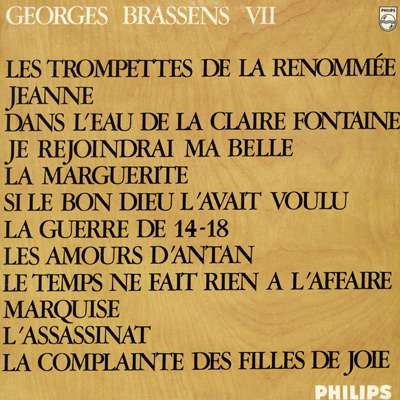
VII (1962)
Jeanne Joan Of Heart
Dans l’eau de la claire fontaine In Forest Pond
La guerre de 14-18 WW I
Les amours d’antan
Marquise
L’assassinat Manslaughter
La complainte des filles de joie Ladies Of Pleasure’s Lament
Highlights
Brassens was totally in the limelight by this time – uncomfortably so to his taste – so he fired back at media and fame with the irresistible Les trompettes de la renommée. He also harkens back to his humble beginnings with the moving Jeanne – a suitable companion piece to his earlier Chanson pour l’auvergnat. Always defensive of being labelled a poet, he nevertheless pens a flawless poem with Dans l’eau de la claire Fontaine, and it’s only the beginning of a delightful album full of tenderness, humour and expletives.
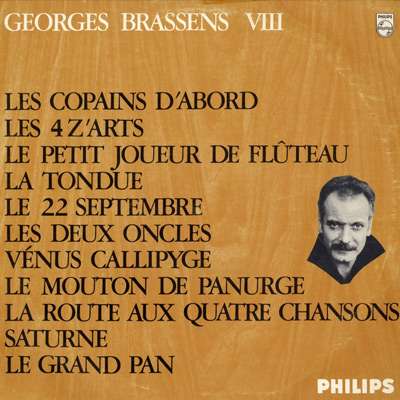
VIII (1964)
Les copains d’abord Buddies All Aboard
Les Quat’z’arts
Le petit joueur de flûteau The Little Piper
La tondue Shear Terror
Le 22 septembre September 12
Les deux oncles
La route aux quatre chansons
Saturne Fall Flower
Highlights
Brassens’ songwriting seems to only improve like a good wine with age. He fires off with an hymn to friendship that will quickly become an anthem for his fans and everyone else (Les copains d’abord) and then proceeds to get into hot water with Les Deux Oncles which tackles the troublesome heritage of WW II, pitting resistant against collaborator. An odd choice, and I won’t feed the polemic that rages on to this day but will simply remind the listener that Brassens goes on to confirm the hellish stupidity of that war with La tondue. As for the other songs, they’re all standouts.
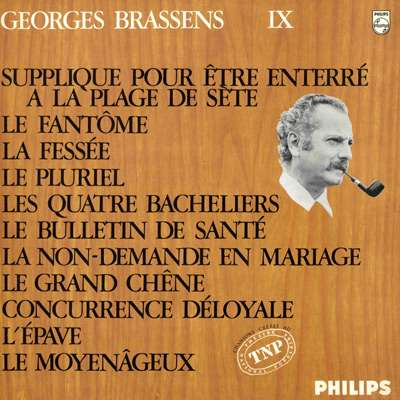
IX (1966)
Supplique pour être enterré à la plage de Sète Supplication To Be Buried On The Shores Of A Faraway Isle
Le fantôme Ghost Story
La fessée Spanking
Les quatre bacheliers Four Sophomores
Le bulletin de santé Bill of Health
La non-demande en mariage Non Proposal
Le grand chêne The Oak Tree
L’épave A Wreck
Le moyenâgeux Middle-Ages Crisis
Highlights
My personal favourite, this is the album that I’d take to the proverbial desert island. Brassens is at his writing peak and from start to finish the songs absolutely shine. They are also perfectly served by the intimacy of their unique recording setting. No frills, just plain goodness. Mind you, this did not stop me from reinventing them my way…
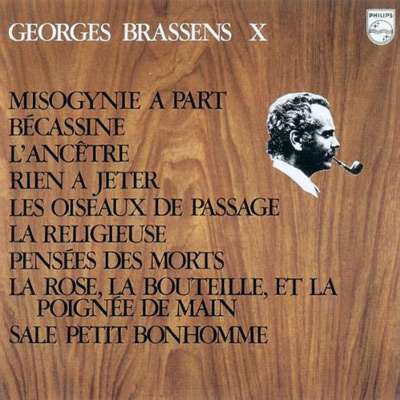
X (1969)
Misogynie à part Misogyny Aside
Bécassine Lucie Lassie
L’ancêtre Old-Timer
Rien à jeter Nothing To Throw Away
La religieuse
Highlights
La supplique… (see IX above) was a tough act to follow and Brassens took his time. He delivers a musically rich collection that demonstrates his constant evolution as a tunesmith with gorgeous adaptations of poems by Lamartine (Pensées des morts) and again Jean Richepin (Les oiseaux de passage), while ‘non-poet’ Brassens offers a true fable for our ages (La rose, la bouteille et la poignée de main). Always on his creative mind, women get the sweet and sour treatment with the raucous Misogynie à Part and the loving Rien à Jeter (a fitting way to describe the whole album).
NOTE sur les pochettes suivantes
PHILIPS avait décidé de laisser tomber les couvertures faux bois pour les deux derniers albums, et ce sans bonne raison à mon goût. Je leur octroie ici une nouvelle continuité.
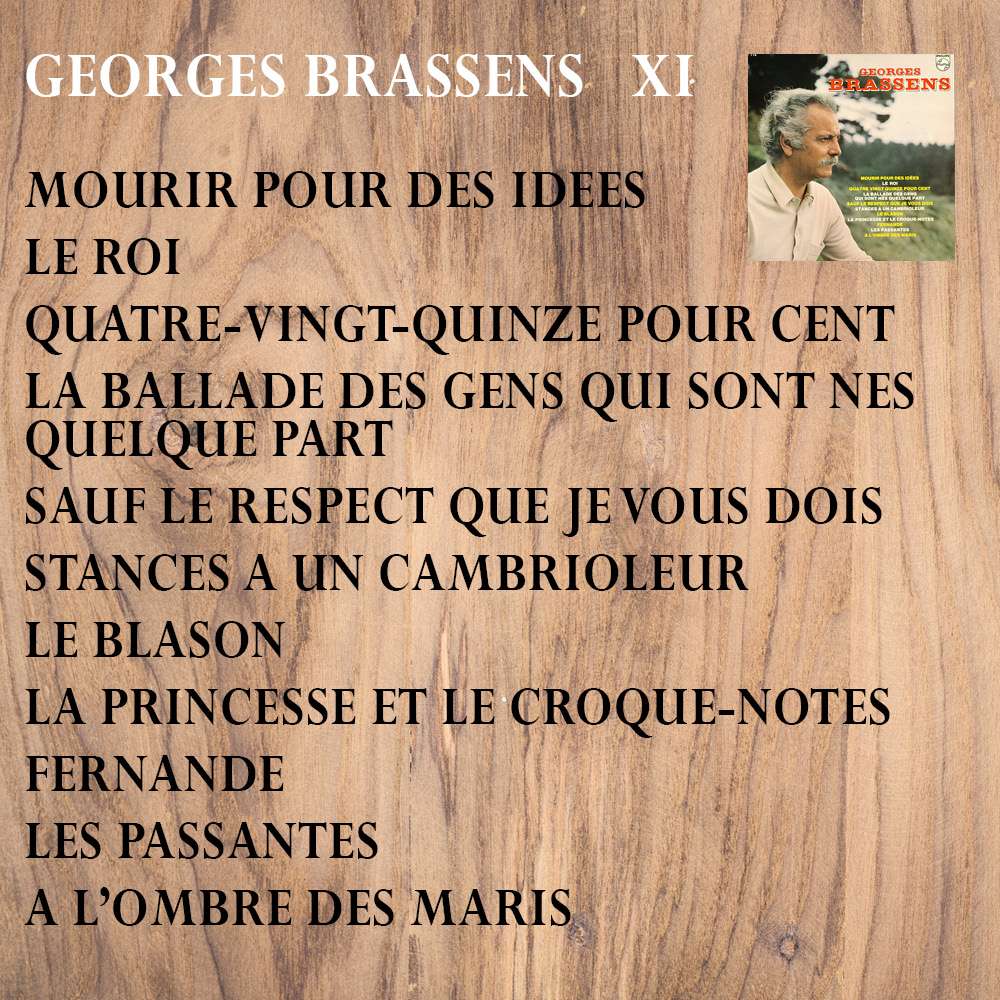
XI (1972)
Mourir pour des idées Dying For A Cause
Le Roi Tush
Quatre-vingt-quinze pour cent Nine Times Out Of Ten
Sauf le respect que je vous dois Pardon my French
Stances à un cambrioleur
La princesse et le croque-note
Fernande Eleanor
Les passantes
Highlights
Ha ha Georges, now that’s a good one! He fires off the most fabulous rhyme in a French song that will find its way on every tongue (Fernande). He follows it up with a melancholy ditty from a totally unknown poet (Les passantes), that soon some will dub their favourite Brassens song ever. Add Quatre-vingt-quinze pour cent and Le blason and ladies are bound to relish the attention. For some obscure reason Mourir pour des idées which picks up where Les deux oncles left off still manages to stir some controversy… go figure!
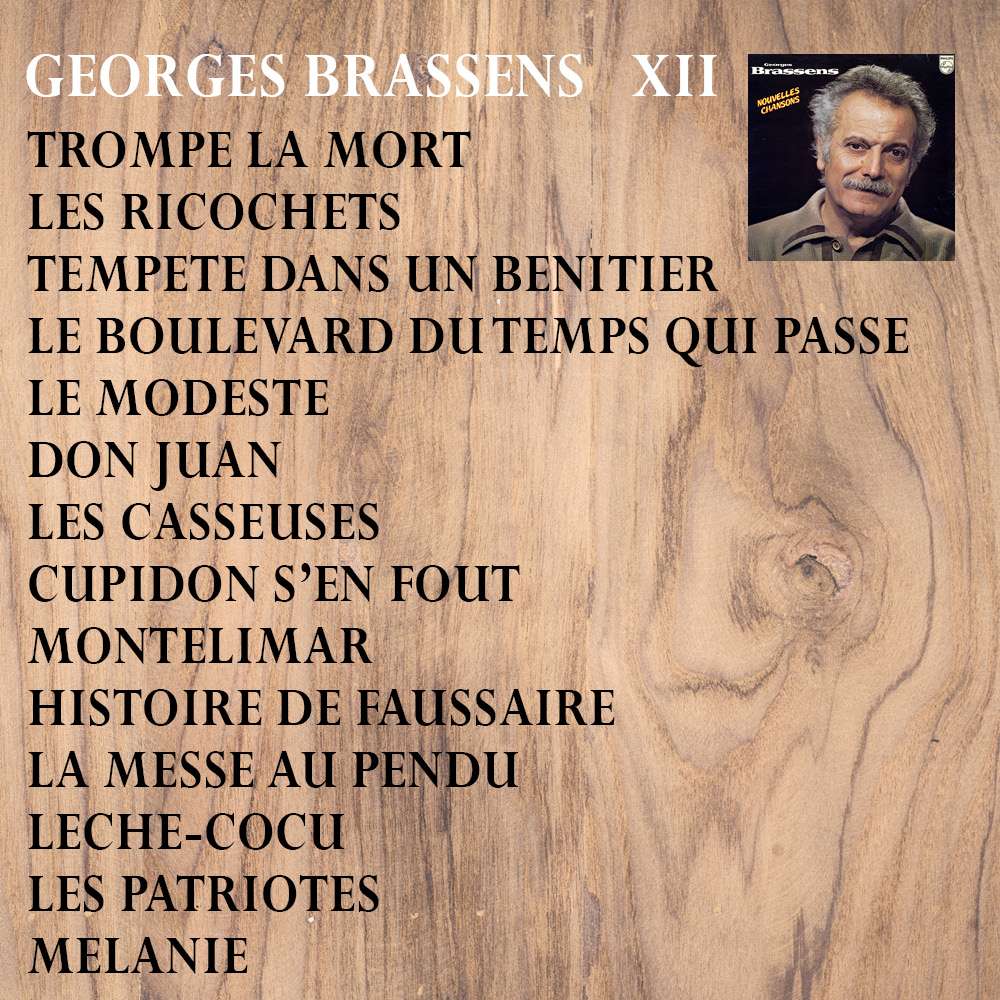
XII (1976)
Les ricochets Skippin’ Stones
Don Juan Casanova
Cupidon s’en fout
Histoire de faussaire Blues for Martha
Mélanie Melanie
Highlights
Originally released under the really imaginative title ‘New Songs’, the disc will sadly turn out to be Brassens’ last one and is to be treasured as such. The bittersweet opener Trompe la mort hits closer to the truth than we could then imagine. But then, the closer Mélanie is a riotous raspberry toward the studio executives who would repeatedly implore Brassens to please tone it down. It is a most fitting coda to a most extraordinary recording career.
Unreleased
Si seulement elle était jolie If only she were a-pretty
Le petit-fils d’Œdipe Œdipus’ Grandson
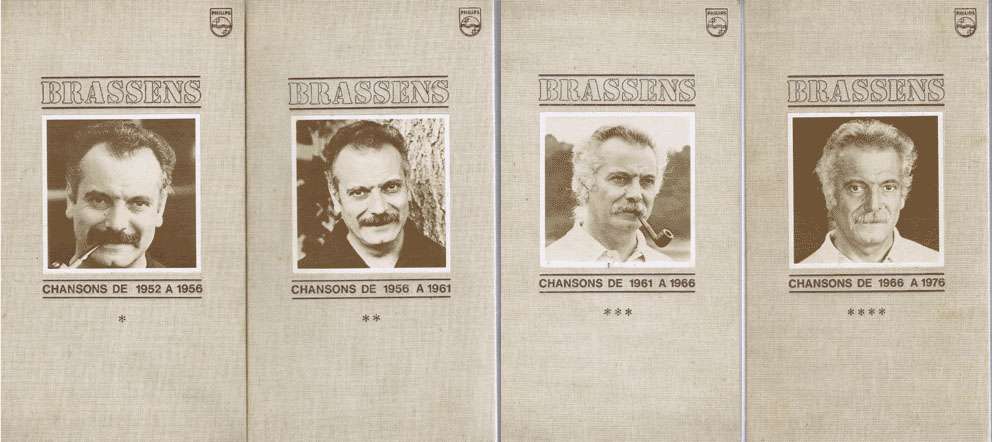
Si ce sont les vinyls de la collection Faux Bois susdite qui ont bercé ma jeunesse en France, ce sont les coffrets toilés de 12 cassettes qui ont accompagné ma vie adulte au Canada.